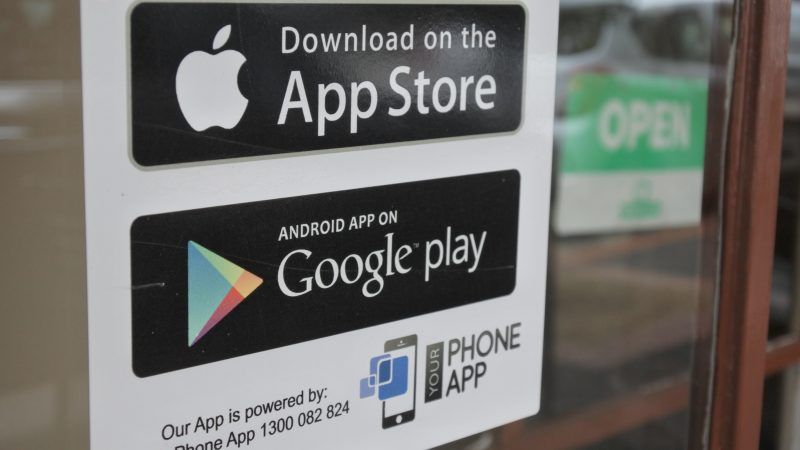App Store Antitrust Case Could Still Tank
Plus: Sen. Josh Hawley continues anti-tech crusade, Pete Buttigieg on tariffs, "toxic femininity," Gen Z panic, and more...

A new U.S. Supreme Court ruling related to Apple's App Store has a lot of pundits and press freaking out. But it's not quite the major loss nor broad-in-scope ruling many are making it out to be.
Yes, the court said an antitrust lawsuit brought against Apple, brought by a small group of consumers, should be allowed to continue. But that doesn't mean that the consumers' claims will be found to have any merit. This wasn't a ruling on the merits of the lawsuit but merely a decision not to shut it down immediately.
"At this early pleadings stage of the litigation, we do not assess the merits of the plaintiffs' antitrust claims against Apple, nor do we consider any other defenses," the court stated.
The 5-4 decision—authored by Justice Brett Kavanaugh—saw Kavanaugh siding with more liberal justices in the majority, which of course has raised eyebrows among those who expected him to be basically a Republican puppet.
Some of the reaction to this decision seems overblown. It's not at all a decision on the merits as p2 makes clear. "At this early pleadings stage of the litigation,we do not assess the merits of the plaintiffs' antitrust claims against Apple,nor do we consider any other defenses" https://t.co/mmAFzVX1FP
— Neal Katyal (@neal_katyal) May 13, 2019
In the case, Apple v. Pepper, plaintiffs argue that the App Store is an unfair monopoly. Apple's lawyers argued that the plaintiffs had no standing to bring the lawsuit, since they're app users and not app developers.
In the dissent—written by Neil Gorsuch and joined by John Roberts, Clarence Thomas, and Samuel Alito—the justices wrote that the majority's interpretation was "not how antitrust law is supposed to work." More from the dissent:
More than 40 years ago, in Illinois Brick Co. v. Illinois … this Court held that an antitrust plaintiff can't sue a defendant for overcharging someone else who might (or might not) have passed on all (or some) of the overcharge to him. Illinois Brick held that these convoluted "pass on" theories of damages violate traditional principles of proximate causation and that the right plaintiff to bring suit is the one on whom the overcharge immediately and surely fell. Yet today the Court lets a pass-on case proceed. It does so by recasting Illinois Brick as a rule forbidding only suits where the plaintiff does not contract directly with the defendant.
This replaces a rule of proximate cause and economic reality with an easily manipulated and formalistic rule of contractual privity. That's not how antitrust law is supposed to work, and it's an uncharitable way of treating a precedent which—whatever its flaws—is far more sensible than the rule the Court installs in its place.
FREE MINDS
Freshman Sen. Josh Hawley (R–Mo.) is quickly outpacing more experienced colleagues at being The Worst:
This @HawleyMO letter to Zuck is simply ????????????????. He's going after privacy failures and something new - the privacy problems implicit in becoming a payments platform, aka a bank. Also he cc's WhatsApp founders Brian Acton and Jan Koum and says hey guys come talk! pic.twitter.com/gf5yzptyBA
— Matt Stoller (@matthewstoller) May 13, 2019
FREE MARKETS
Pete Buttigieg continues to be OK:
Quick reminder: a tariff is a tax. On Americans.
— Pete Buttigieg (@PeteButtigieg) May 14, 2019
QUICK HITS
- Buzzfeed, bright young thing of the millennial era, has become one of the biggest panic-stricken scolds about today's teens/young adults and technology.
- Meghan McCain is the poster child for "toxic femininity" suggests The Guardian's Arwa Mahdawi.
- Fraser Myers with some counter-intuitive reasoning on why it was good for the BBC to "platform" Ben Shapiro.
- Shoshana Weissmann on how not to regulate social media.
- 100 times this:
Hey journalists if you want to be a cop be a cop. That's not our job. pic.twitter.com/Zt6S3Fdez2
— Gene Park (@GenePark) May 8, 2019
- Millennials sometimes move out of expensive places when work doesn't require it and The New York Times is on it!
- This is an interesting piece on multi-generational housing and the future of suburban spaces, even if it seems a bit performatively clueless at times.
- Protecting and serving:
NEW: Indpt experts spent 4 days at the Houston home where 2 ppl were killed in a drug raid. They found no signs the pair fired at cops - and plenty of signs that CSI teams did a cursory investigation, leaving behind bullets, tagged evidence & 2 teeth. https://t.co/qYProc57PM
— Keri Blakinger (@keribla) May 14, 2019
- Marijuana legalization in New York and New Jersey is running into roadblocks.
- Awww:
It would shock and appall 25-year-old me that the best take 35-year-old me has heard on Facebook bannings comes from a goddamn libertarian podcast. https://t.co/tdFbzM1Zx8
— Katie Herzog (@kittypurrzog) May 13, 2019
